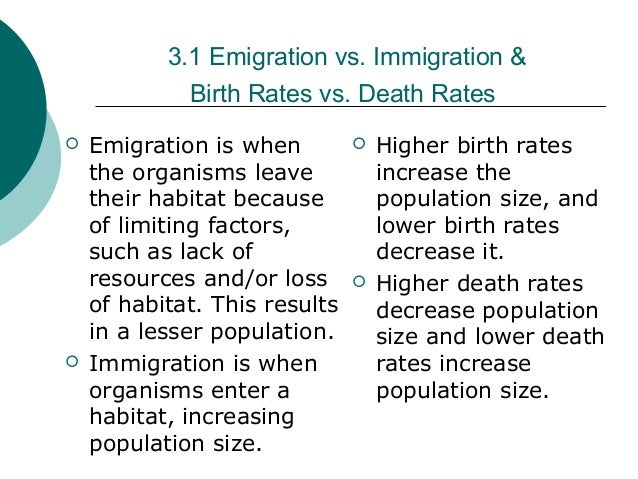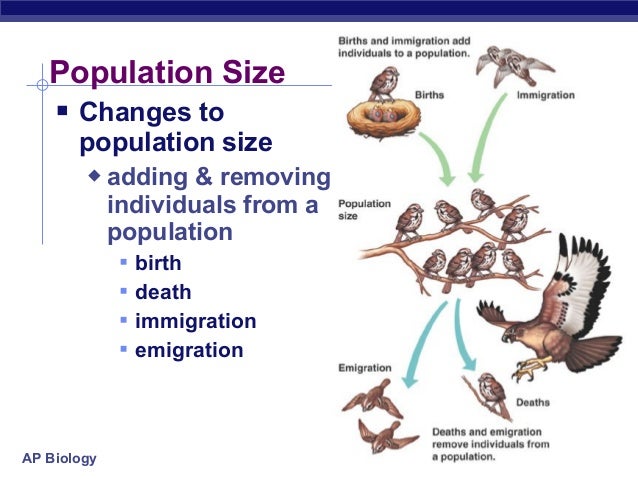
What is the difference between an immigrant and an emigrant? What does emigration and immigration mean? Is migration the same as immigration?

Organic selection signifies diverse processes, including random mutation, and random choice. Who are emigrants and what is emigration ? Emigration involves leaving a population, while immigration involves. An emigrant , on the other han is “someone who leaves a country or region. Its prefix, e-, also comes from Latin and means “out of.
So, an emigrant is someone who is moving out of a country. Moreover, emigration has derived from the Latin emigrare which means to move. Animals that immigrate or emigrate do not return to the land they left. It is somewhat in the same context as immigration , but the act is the opposite. As with immigration , it usually refers to a permanent relocation of residency and is applicable only to people.
The difference between “ immigrate” and “ emigrate” is that “ immigrating” is the act of entering a foreign country to live while “ emigrating” is the act of leaving a country to live in another. Biology Review Ecology. My grandparents emigrated from Norway.
The definition of immigration vs emigration is vital to some researchers and educators and many contemplate the diffusion and natural selection a part of these biological models. Organic choice implies diverse processes, including random mutation, and random selection. When emigration and immigration occurs, evolution occurs because the gene pool is changing. One of the main reasons why people emigrate is to improve their quality of life or their chances of employment. Though immigration and emigration are movement of people from one country to another, the former means movement of people to a country and the later means movement from a country.
Immigration is the movement of individuals into a specific area. Migration, on the other han is a topic of anthropological interest. There are times when migration of a population set to another country sets off political strife owing resistance from the native population, a struggle for resources, or. The difference between emigrant and immigrant relates to the point of view of which country is the country of origin and which is the destination country. When a person immigrates, he or she moves to a new country.
In The Song of the Dodo , David Quammen dives into how equilibrium affects a species’ ability to survive, and how it impacts our ability to save animals on the brink of extinction. How different are the concepts of migration, emigration and immigration ? Migration is the movement of individuals of a species from one place to another. Free English Vocabulary lesson) - Duration: 12:39. Movement is now seen as a key process in its own right and not just an alternative mechanism contributing to.
Emigrate refers to those who leave your country to take up residence in another country. If the birthrate and immigration went up, and the death rate and emigration go down, then the population would increase. If the deathrate and emigration went up, and the birthrate and immigration went down, then the population would decrease.
Conversely, immigration describes the movement of people into one country from another (to permanently move to a country). An international scholarly journal publishing peer-reviewed research focused on issues. Both are acts of migration across national boundaries. The verb emigrate (also written as emigrated or emigrating) is the act of leaving a native country or region to reside elsewhere. The word emigrate stresses the act of leaving a homeland rather than arriving in a different country for residency.

What the difference about immigration and emigration ib biology ? The main difference between the two is perspective. Immigrate is to come into another country to live (think: enter). For example, if someone who lived in Norway moved to France, they would have emigrated from Norway and immigrated to France. In history, here is an example of emigration : During the potato.
To immigrate is to settle in a new country or region. To emigrate is to leave a native country or region to settle elsewhere. Obviously the words are closely related and similar enough to elicit confusion, but they’re easy to remember if you think of immigrating as arriving and emigrating as leaving.

No comments:
Post a Comment
Note: Only a member of this blog may post a comment.